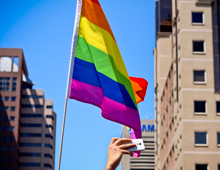[intro]A protest at last year’s Gay Pride Parade in Cape Town brought numerous class, race and other divisions to the fore. This year a breakaway group are organising a march in Khayelitsha, which is scheduled for this weekend. Chelsea Haith reports…[/intro]
Cape Town Pride was protested in 2015 for the first time since the parade’s inception in 2001 and the accusations of a lack of inclusivity have rocked Pride organisers’ pedestal. 200 people protested wearing t-shirts that demanded ‘Nothing about us without us’ and carrying signs which read ‘Marching for inclusion and social justice’ and ‘Your white privilege stinks’.

Sivu Siwisa leads the protest at Cape Town Pride. Image by Nikki Carter
After accusing the Cape Town Pride of excluding minorities, transsexual and transgender people from the popular festival, a group of LGBTI organisations are taking matters into their own hands with Khumbulani Pride, which is taking place in Khayelitsha this Saturday.
The Khumbulani LGBTI Pride stands in solidarity against transphobia, homophobia and xenophobia and started in 2013 when it was hosted in Gugulethu and Nyanga. In 2014 it took place in the Samora Township and this year the Pride will take to Khayelitsha’s streets, where 233 cases of sexual crime were reported last year alone.
Accusations levelled at the parade organisers, and in particular at Matthew van As, the head of the Pride organising committee, is that the parade focuses on celebrating the rights and sexuality of white gay men exclusively.
Free Gender, an organisation which supports and represents homosexual people in Khayelitsha, lashed out at van As and the Pride organisers by refusing to participate in the parade again this year. Genderqueer activists Funeka Soldaat, the chairperson of Free Gender, said that the organisation did not wish to participate in the planning of the event “because of the exclusion of the black LGBTI community”.
Van As lashed back claiming that Soldaat is too ‘focused on race’.
“We do not see race, gender, we only see homosexuals; its utter rubbish,” said van As, “[Pride is] a celebration of what we have. We don’t forget the people that came before us and it upsets me that some people think they have more rights than me, just like I can’t help being gay, I can’t help being white. Look at Funeka’s group, Free Gender Khayelitsha, they’re solely black females. So how inclusive is she?”

A question of race
Cullen Maclear, a student at Rhodes University said that he felt Pride was divided because the LGBTQIA community is itself divided along racial and cultural lines. “The thing about Pride is that the queer community is very divided. Even among gay men. Here it’s black gay men versus white gay men, gay men who are masculine versus gay men who are feminine, muscular gay men versus non-muscular gay men, sporty gay men versus arty gay men,” he said.
Miles Collins, a transgender Capetonian, suggested that the commodification of the attractive white male body during Pride at bars such as Beefcakes as well as the harmful stereotype of the friendly gay hairdresser in Constantia has lead to a situation in which “mainstream gay is made consumable and thus okay”. Collins said that this acceptance of white gay men is “not acceptance of LGBTQIA people, it’s just convenient politics”.

The protestors tshirts voiced their views too Image by Nikki Carter
Legal concerns
Van As stated that the protestors’ actions may have damaged the possibility of holding a Pride parade next year and called the protest a ‘selfish act’. “We followed the letter of the law. I hope they haven’t jeopardised our application for next year’s Pride march,” he said, before claiming that the protest was illegal.
Busiswe Deyi, a legal researcher at Gender Dynamix said, “There is no such thing as an ‘illegal’ protest, everyone has the right to protest. Besides, Pride is supposed to be a space for all queer persons to occupy in whatever way they deem necessary in order to bring voice to their struggles,” she said.
“His comments prove that Cape Town Pride is indeed a space for a select few, namely white, cisgender gay men. Our actions did not put anyone in danger, if anything our actions put us, the protestors, in danger – symbolic of the reality our bodies live in on a daily basis.”
During the protest the marchers held a sit in which stopped the parade for a period of time. Van As frames this as detrimental to the future of the Pride parade. “Stopping the procession meant affecting the traffic plan agreed on by the SAPS, Traffic Services, Events Department and Cape Town Pride which in turn affects traffic flow and MyCiti bus services. This does affect our application for next year,” he said.
“According to the Gatherings Act people have to apply for a protest/march permit which involves consultations between both the SAPS and parties involved. The events department and SAPS did find their posters racially offensive in a tone which is illegal. Stopping the procession put both the protestors and people in the Parade in Danger,” said van As.
More LG than BTQIA
In 2014 it was determined that an oversight committee would be established to ensure that Pride became more inclusive because members of the gender queer, transsexual and transgender communities felt that Pride in 2014 was dominated by white, affluent or middle-class gay men.
According to Zethu Matebeni, a former member of the Oversight Committee and a Senior Researcher at the University of Cape Town, several of the organisers left the committee in 2015 because there was a lack of transparency and inclusivity in the use of the funds and the Pride events respectively.
“Matthew told us that the events for pride were non-negotiable. The Millionaires Gala, that’s for white gay men. They cannot understand that it’s a problem to have an event like that. We don’t know where that money goes or how much was raised, none of that is made available,” said Matebeni. Matebeni identifies as gender queer though added that she is identified externally of herself as a black lesbian.
Just weeks before the Pride was to take place Matebeni and several other members of the Oversight Committee “decided to leave the Oversight committee to join more inclusive spaces and projects”.
Speaking for the inclusion in Pride of people who do not fall within the binaries of men/women or straight/homosexual, Matebeni said, “The T-B-I-A is side-lined. We can’t even say it’s a movement. We need to expand beyond the binary.”

Physical distance creating emotional divisions
Deyi said that the festival is not inclusive of low-income or disadvantaged people due to the costs and location of the parade. “Pride is often in white middle-upper class spaces and requires a person to have at least R200 to participate in those spaces. For some people this is ridiculous when you consider that the spaces in which these events are held are far away for most people in my socio-economic class to travel to without compromising their safety,” she said.
Van As mentioned that he had paid out of his own pocket for taxis to bring in people from outlying areas in Cape Town wishing to participate in the Parade that day. However, Deyi said that transport remains risky and there is still a danger to personal safety. “Participating in Pride becomes an issue because I have to either find accommodation closer to the events or risk travelling at night with public transportation which is often unsafe for gender non-conforming persons,” she said.
“Transgender persons are a marginalised group within an already marginalised group. Pride does not provide a space in which GDX and other organisations can begin to conscientise the rest of the LGB community and begin to build solidarity and understanding,” Deyi added.
The protest seems to be symptomatic of the increasing level of awareness and the necessary protest against unheeded white privilege which is underway at universities across the country.
The sentiments expressed at the Inclusive Pride protest during Cape Town Pride indicate that there is an intersection between communities that feel marginalised due to sexual or gender orientation, social class as well as those that hold the same grievances about the lack of self-reflexivity by the dominant discourses of European cultural hegemony in the academy and broader society.
Find out more about Khumbulani Pride, taking place this Saturday.










